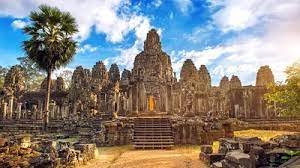Angkor Wat Becomes the 8th Wonder of the World
Angkor Wat, the magnificent temple complex in Cambodia, has been honored with the title of the 8th Wonder of the World, adding a prestigious accolade to its already storied history. This UNESCO World Heritage Site stands as a testament to the grandeur of ancient Khmer architecture, drawing millions of visitors worldwide to marvel at its breathtaking beauty and historical significance.

Why this News is Important
Recognition of Cultural Heritage: The recognition of Angkor Wat as the 8th Wonder of the World underscores its cultural and historical importance, not just for Cambodia but for the global community. This acknowledgment elevates awareness of the rich heritage preserved within its walls.
Boost in Tourism: With this esteemed title, Angkor Wat is poised to experience an influx of tourists, leading to economic benefits for Cambodia. The increased attention and interest from travelers could contribute significantly to the country’s tourism industry and local economy.
Preservation Efforts: The designation as the 8th Wonder emphasizes the need for continued efforts in preserving and safeguarding cultural landmarks worldwide. It highlights the importance of conservation to maintain these historical treasures for future generations.
Historical Context
Angkor Wat, constructed in the 12th century during the Khmer Empire, was originally built as a Hindu temple dedicated to Lord Vishnu. It later transformed into a Buddhist site. This sprawling complex covers over 400 acres and is renowned for its intricate architecture, bas-reliefs depicting Hindu epics, and stunning sunrise views.
Key Takeaways from “Angkor Wat Becomes the 8th Wonder of the World”
| Serial Number | Key Takeaway |
|---|---|
| 1. | Angkor Wat, a UNESCO World Heritage Site, is now the 8th Wonder of the World. |
| 2. | The temple complex is a testament to ancient Khmer architecture and cultural significance. |
| 3. | Angkor Wat was originally a Hindu temple dedicated to Lord Vishnu, later transformed into a Buddhist site. |
| 4. | The recognition emphasizes the importance of preserving cultural heritage sites globally. |
| 5. | This accolade is expected to boost tourism, benefiting Cambodia’s economy. |
Important FAQs for Students from this News
Q: What is the significance of Angkor Wat being named the 8th Wonder of the World?
A: The recognition elevates its cultural importance globally, boosting tourism and highlighting the need for preservation.
Q: What makes Angkor Wat a UNESCO World Heritage Site?
A: Its historical value as a Khmer architectural masterpiece and its intricate design.
Q: Who originally built Angkor Wat, and for what purpose?
A: Angkor Wat was built by the Khmer Empire as a Hindu temple dedicated to Lord Vishnu.
Q: What efforts are required to preserve cultural landmarks like Angkor Wat?
A: Continuous conservation and safeguarding measures to maintain their historical integrity.
Q: How might the recognition impact Cambodia’s economy?
A: The designation is expected to increase tourism, leading to economic benefits for Cambodia.
Some Important Current Affairs Links

















